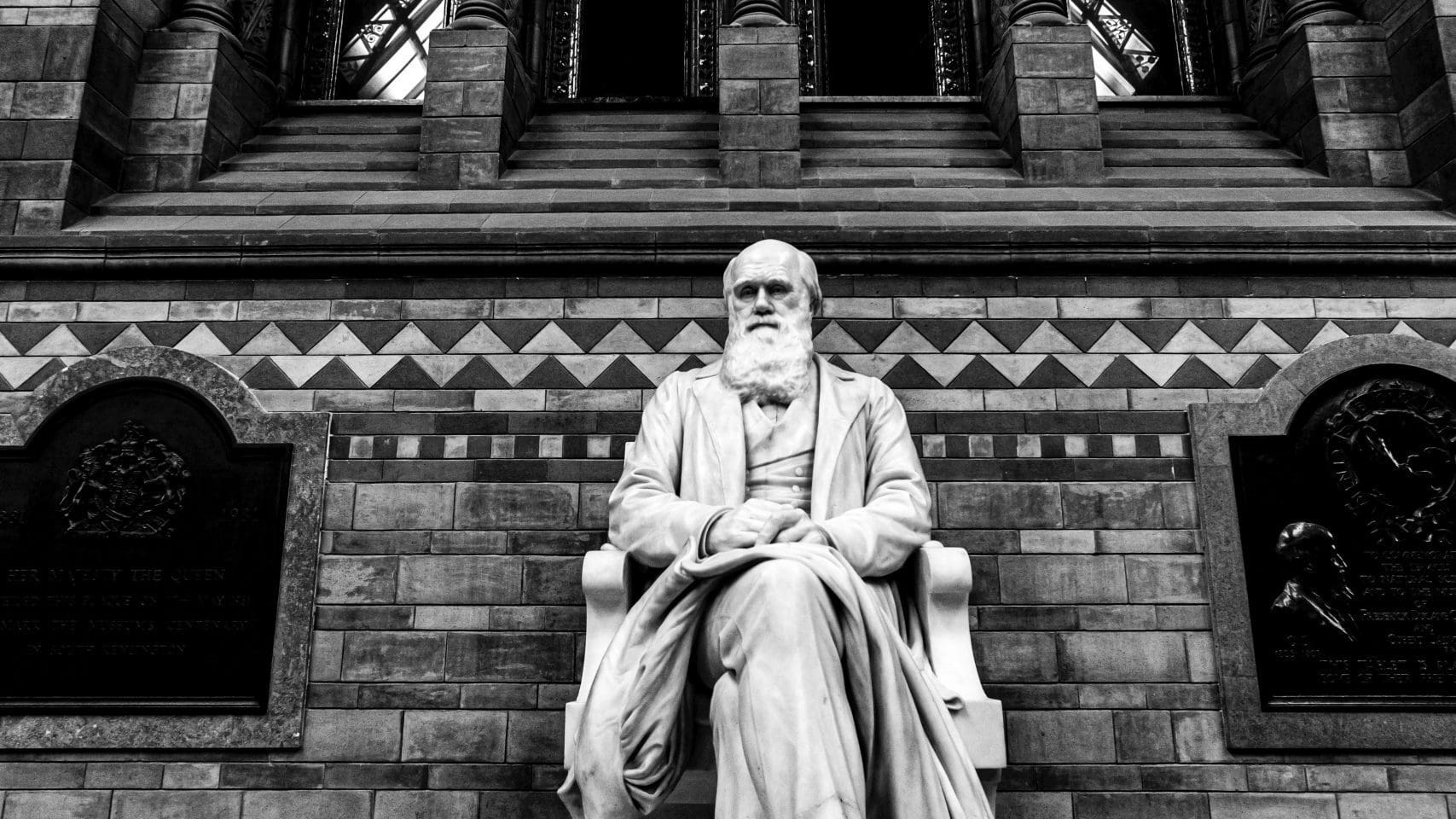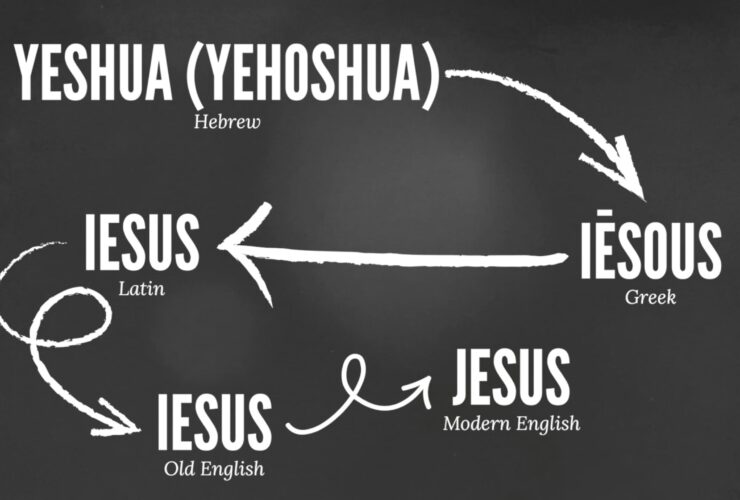There are many points of contention, to put it gently, between Creationists and Evolutionists: How science should interpret or illuminate Scripture; Big Bang cosmology and the beginning of the material universe; age of the earth or length of days in creation; gradual formation of intended kinds or immediate kinds of creatures; did “death before sin” exclude animal death; human origins and the historical Adam and Eve; the long lifespans of the genealogical record; global flood or local flood–––to name the most prevalent. All said contentions originate in Genesis 1-11 and the accuracy of cosmological (Genesis 1:1–2:3), antediluvian (Genesis 2:4–8:19), and postdiluvian (Genesis 8:20–11:32) accounts. Each camp sources evidence for their scientific position from various passages scattered throughout the Bible – Job, Psalms, John, Romans, 2 Peter, et cetera – using Scripture as the final word or boundary line for how far science can reach without compromising or contradicting the text, or even for how science complements it. But this family feud has evolved into an all-out war, with one camp condemning the other as heretics and false teachers and the other camp reproaching the former for casting superfluous stumbling blocks at non-believers[1]. And when there’s war, there’s propaganda: Young Earthers lack intelligence, Old Earthers lack integrity. Creationists are too literal, and Evolutionists are too liberal. All while they indict each other of concordism: the art of injecting modern science into Scripture.
Now there is a gradient of views on this subject, and you may not even directly fall under either view. Or, perhaps, you may think our origin story doesn’t even matter. I, for one, think it does. Although I am a Creationist who believes in a historically recent Adam and Eve, I do not identify as a Young Earther, Old Earther, or Evolutionist. I do not think the scientific age of the earth is the heart of problem, so identifying as, say, a “Young Earther” is a moot point, in my mind. This means that I come across, to Young Earther’s dismay, as much more of a centrist when it comes to this conflict in the Church, which is, admittedly, not a popular position nowadays on either side. Yet, if I’m being honest, it is because I’m a foundationalist when it comes to Scripture and epistemology that I come across as centrist, not because I’m apathetic. I’m not neutral by any means. Be that as it may, my mission is to provide clarity within the Church on this very tense topic. And despite the rather large gap between them, there is good common ground, here, that should not be overlooked.
“All camps affirm that a person’s scientific view of Genesis does not interfere with salvation by grace through faith.”
All camps affirm that a person’s scientific view of Genesis does not interfere with salvation by grace through faith (Ephesians 2:8-9), and that it is by faith that one understands the universe was created by the word of God (Hebrews 11:1-3). All camps agree on the historical reality of the necessary anchor points presented in Scripture to retain theological sustenance, albeit differently.
Each camp is, however, charging the other for muddying the water on what’s orthodoxy and obligatory belief; using Scripture and science to thrash each other’s position on history, theology, and theodicy. The battle, then, is actually over what is theologically optimal and doctrinally normative in the wake of modern scientific conclusions. So, let’s quickly breakdown the beliefs and sticking points from each camp – Young Earth Creationism, Progressive or Old Earth Creationism, and Evolutionary Creationism – starting with the two ends of the spectrum.
The War Camps
Young Earth Creationism (YEC), also called the traditional view, believes the creation account is integral, if not, necessary to the gospel and Evolution contradicts this fact. To understand this, YECs believe in the plain reading of Biblical authority is above all and theology is “Queen of the sciences”. Genesis, then, clearly teaches a verbatim historical creation account of physical reality and is, largely, anti-poetry[2] because the theological teachings of Jesus Christ and the apostles, as well as Fundamentalist and Evangelical theology, all presuppose the historicity of Genesis. Particularly, that sin and death entered the world through one de novo historical man: Adam (Romans 5:12-21, 6:23). With every textual detail having strict physical correspondence, it entails that our understanding of spiritual reality found in Genesis can be compromised or constrained to favour physical reality. While YECs mostly agree that evolutionary beliefs do not a compromise salvation[3] – repentance and belief in Christ’s resurrection and full devotion thereof – they do seem to imply that it is a salvation issue by claiming evolutionary beliefs compromise the gospel, likening the matter to the apostle Paul’s stern warning (Galatians 1:8). While this may not be a deliberate conflict, this thick wedge has led to a widespread verdict that “there are Christians” and “there are Evolutionists”. To convey the sentiment: There is only one tree of life and it’s not Darwin’s.
In summary, Genesis 1-11 is a sequence of historical and scientific brute facts and modern science fills in the gaps. Genesis the bricks, science the mortar. The bricks just so happen to be extremely tight and, at times, slathered in mortar.
Evolutionary Creationism (EVC) believes modern science can fit into Scripture where it can and that evolutionary beliefs have no bearing on the Gospel. Genesis teaches that a physical creation happened, but it is primarily Hebrew poetry/narrative, so the historical and physical reality of this account can be compromised or constrained to emphasize theological understanding or a spiritual reality. This has led to a gradient of viewpoints: Genesis as (a) protohistory, early casual historical explanation dissimilar to our strict modern expectations for historical reliability, (b) ancient historiography, (c) historical poetry, (d) mythohistory, an historical account mixed with mythological archetypes and tropes, or (e) even as myth itself. This is largely because the content in Genesis 1-11 is very different from what we observe today and difficult to understand. It is also not considered essential for salvation and belief in Christ, nor does Genesis, New Testament, and Church history explicitly teach that it is doctrinally essential. In fact, the historicity of Genesis 1:1–2:3 is an age-old inquiry in the Church (and Judaism) long before modern science and evolutionary theory came about. Many EVCs that affirm Biblical inerrancy maintain that Genesis is not an open book, but it is written in an ancient context, which is restrictive for modern science. Therefore, Genesis contains anchor points of truth like creation ex nihilo, historical Adam and Eve, the Fall, Flood, Babel, et cetera, but it does have a lot of wiggle room on the exact nature of these accounts since it’s not binding. EVCs believe that science is independent of theology, so science can be used to support Scripture where it can, but not change what it teaches. Scripture provides objective spiritual truth; science provides objective physical truth. That said, the wide variety of nuanced views about what the Bible truly teaches is a bit disconcerting. Given that Genesis is generally not interpreted literally, that is with strict physical correspondence, there is little to no consensus on what is historical or actual about it.
In summary, Genesis 1-11 is a sequence of historical anchor points that utilizes ancient narrative and poetical devices for spiritual revelation that can, in turn, be illuminated by scientific evidence. Again, Genesis the bricks, science the mortar–––the gaps are just wider, the bricks a bit looser. It is to this variation that I intend to refer to as EVC from this point on, those who maintain Biblical inerrancy and Scriptural authority, and not theistic evolutionists who write off Genesis as pure fiction. It is self-evident that if Genesis were a mere myth and robbed of its historicity, only “spiritual” with no real-world correspondence, then NT theology crumbles into abstraction (and many EVCs adamantly agree). It’s just a matter of time.
Progressive or Old Earth Creationism (OEC) believes the creation account is integral, if not, necessary to the gospel and biological evolution contradicts this fact, but not modern cosmology. OECs typically hold to similarly strong interpretational views of Scripture like YECs, that each verse of Genesis 1-11 and other cosmological references have strict physical correspondence. Old Earthers, rather, chiefly divide over a very narrow perspective on Genesis 1: the Bible teaches the Big Bang, and the first six days of creation are not literal 24-hour days because the Hebrew word yom can also mean “age” or “aeon”. Despite the slight difference in Biblical interpretation between them, Young Earthers and Old Earthers do not get along, and Evolutionary Creationists don’t get along with Old Earthers, either. They all largely view each other as compromised in some sense. YECs view OECs as a gateway and slippery slope to affirming evolutionary belief–––a little leaven leavens the whole lump, as they say. EVCs view OECs as concordists for imposing modern science onto an ancient cosmology, such as the Bible teaches Big Bang cosmogony.
Long day short, there seem to be a gradient of belief that begins with YEC and ends with EVC. I have lumped Old Earth Creationism as well as Intelligent Design (ID) between the YEC and EVC camps because their views tend to more so overlap with modern scientific conclusions (and secularism) than there is with YEC, such as the affirmation of the Big Bang and a four-billion-year-old Earth (simply put; Evolution as a whole depends on the explanatory power and scope and preconditions of these origin theories, all of which YEC aims to debunk). But I fully recognize that OECs and IDs are, in fact, their own distinct camps and not necessarily ‘more’ secular. I just see each of them between the two extremes – Young Earth Creationism and Evolutionary Creationism – and I want to stay focused on the extreme ends and not bog down this series of articles by the abundance of nuances between each camp–––and there’s a lot. YECs tend to be more firm and uniform in doctrinal belief across ministries (Answers in Genesis, Creation Ministries International, Institute for Creation Research, et cetera), but Christians who affirm modern evolutionary science in any respect vary in individualism and have a wider range of nuanced beliefs (Reasons to Believe, The Discovery Institute, Reasonable Faith, BioLogos, et cetera), which makes it difficult to pin them all down at once without getting into tedious, minutia arguments.

The Battlefield: Evolutionary Theory & Natural Theology
Now if you didn’t catch it, YECs have laid two accusations: (a) Evolution contradicts Scripture, and (b) Evolution compromises the salvation call. Whereas EVCs are on the defensive: (a) Evolution does not contradict Scripture, and (b) the traditional view of Genesis is not necessary for salvation. In other words, the argument is that Evolution contradicts both creation accounts: Old and New, physical and spiritual, Adam and Christ. So, what does the study of nature have to do with Scripture? And what is Evolution, really?
Concerning Scripture’s relationship with nature, there is a thick tension that cannot be cut by mere belief. If something is true, then we ought to expect, if not, anticipate said truth in the real-world, independent of the Bible, which is why the feud is so heated. If external evidence from nature overwrites what the text teaches is true, it loosens its sense of divine supervision, and Scripture testifies to real-world, historical facts that happened outside of the text. Anything taught in a historical context in Scripture is history. If scientific evidence and theory verifies something is fact, then it ought to synchronize (well) with the Biblical data. That is, the Bible will not oppose or teach contrary views to reality. God made both, after all. This harmonious relationship between the two is greater than just scientific or historical confirmation; even so far as to implicitly know and “suppress the truth” of the supernatural origin and divine participation in the world, as corroborated by Paul who argues that God’s “invisible attributes” are plainly visible in creation (Romans 1:18-20). God has revealed Himself to humanity through His creation (general revelation) and His heart through Scripture (special revelation)[4], so the material universe that is reliably verifiable through the canons of observation, experiment, and reason ought to act as supporting evidence for Biblical account and vice versa. The presuppositional warrant on the relationship between science and Scripture, then, is grounded in natural theology. Where they disagree is on the weight of evidence. YECs believe evidence found in nature is subservient to the Bible in all respects, whereas OECs, IDs, and EVCs mostly believe there are two complementary books: Scripture and Nature[5].
Due to this difference in priority structure, unlike YECs who strictly use the Bible to determine historical facts in the sciences, EVCs see no issue in letting scientific evidence mediate a direction to develop theories or explain phenomena in the natural sciences, independent of the Bible. In other words, scientists should follow the physical evidence where it leads them, but only to a point. Scientists can only draw conclusions through focused, incremental efforts of inductive reasoning, and therefore cannot draw air-tight, universal, absolute certainties–––truth, as it were. The nature of scientific inquiry in general never sets out to prove or disprove anything with absolute truth or certain knowledge, it is always provisional based on evidence[6]. Notice the stark contrasting goals of Scriptural inquiry and scientific inquiry. Scripture claims to teach the truth of God. Science claims to produce probable and provisional outcomes. This is vitally important. However, it is not foolproof. When the explanatory power and scope of a scientific theory is so elegant and sophisticated and compelling, so that it seems nearly impossible to reason against, the line between probable and true might be difficult to see, and is often crossed.
So–––is the scientific evidence found in nature, as depicted in evolutionary models, in any sense compatible, complementary, or contradictory to what Scripture testifies about creation? That God created the cosmos and its creatures. To that, we need to ask: What is Evolution, really? What does everyone mean when they say “Evolution”?
What is Evolution, really?
Evolutionary science is a subdiscipline of the natural sciences – physics, chemistry, geology, biology, et cetera – that aims to progressively understand the physical world based on observable physical evidence alone. Origins science attempts to understand the origins of life and cosmos as well as the conditions of the early earth and universe that can produce life. Evolutionary science differs from origins science because it focuses on the progressive transition of living creatures, whereas origins science focuses on the inquiry of how non-life became living creatures. In a nutshell, origins science is non-life to life and evolutionary science is life to life. Evolution, then, does not include Big Bang cosmology, it is a different theory altogether. But as I said before, evolutionary science depends on the billions of years timescale proposed by origins science; hence the reason why YEC will lump the Big Bang and OEC with the term “Evolution”. All that to say, Origins science is integral to the Creation Evolution debate.
With that in view, the theory of evolution is typically comprised of five theses – ancient earth thesis (earth is billions of years old)[7], progress thesis (life develops from simple to complex lifeforms over time)[8], common ancestry thesis (all living creatures descend from one original lifeform; i.e., tree of life)[9], descent with modification (offspring adapt and differ in subtle variations from parents)[10], and natural selection (a naturalistic mechanism of random genetic mutation drives this process of descent with modification)[11] (see Endnotes for proper definitions) – the latter two of which Creation scientists (YEC and OEC) affirm in subtle variations only; if God created plants and animals “according to their kinds” (Genesis 1:11-12,21,25), then crossbreeding, common ancestry, and the morphological change from one kind to another kind is Scripturally deficient. This is in stark contrast to EVCs who largely affirm all five models are plausible. That God created animals “according to their kinds” does not exclude how He made animals come into their own kind as we observe them today, where Scripture emphasizes God’s intention for kinds over the process of kinds, so the argument goes[12]. Of course, it is common knowledge that each biological evolutionary thesis is Darwinian by descent and propagated in naturalism, atheism, scientism, et cetera. That the origin of life and cosmos was not a special creation but blind, random processes over billions of years by virtue of the ordinary laws of physics and chemistry has become the hallmark of Darwin’s procession–––now the Neo-Darwinian worldview. Hence, the tension today: You’re either for Scripture or against it. Ironically, the two modern scientific view YECs holdfast to – natural selection and descent with modification – is the bread and butter of Darwin’s proposal, and yet they adamantly reject any such affiliation with the theory of evolution, and with Darwin, too, for that matter. Hence some of the mass confusion and loose allegations between camps. Creation scientists believe in one fifth, if not, two fifths of Evolution, but deny all of it. When a YEC claims to reject “Evolution”, one could rightfully question which thesis of evolution they are referring to.
Why do this? Well, according to YECs, to reject Evolution (capital E) is to reject the synthesis of all five theses, not each thesis distinctly. YECs believe there is strong evidence for natural selection and descent with modification, and a synthesis of said two theses does not necessarily contradict YEC views. Either way; the wholesale rejection of Evolution, and even the term, is had on the notion that it is a byproduct of naturalism and that Darwin himself was, in fact, a naturalist attempting to oust God from science. But is this right? Put Darwin’s motivations aside for a moment. Does Evolution entail naturalism? Or rather, is Evolution compatible with naturalism? Second, is naturalism compatible with the origin of the life and cosmos? To that, we need to know if there is good reason to doubt naturalistic Evolution.


A Reasonable Doubt
First, there are many scientific reasons to doubt naturalistic Evolution. Space forbids me from going overboard, so here are but a handful:
(a) All leading cosmological models infer a beginning of the universe, which means that when the cosmos came into being there was a point “before” the fundamental properties of the universe – time, space, energy, mass, gravity, force, laws of nature, et cetera – which directly points to a supernatural origin point or agent for the creation of all things: spaceless, timeless, nonmaterial, uncaused, and unimaginably powerful–––God.
(b) All models lack the explanatory power for the fine-tuning of the fundamental constants of the universe as well as the “anthropic question” for why the laws of nature are fine-tuned for a life permitting world; it further lacks the evidence of an explanatory mechanism for how life and consciousness came into being through the ordinary laws of physics and chemistry alone.
(c) It is observably unfalsifiable because the end result of large-scale cosmological and biochemical processes cannot be fully empirically verified, tested, reproduced, and repeated like the origin of the spacetime, energy, gravity, et cetera (Big Bang), non-life to life (primordial soup theory), and the evolution of new forms of life (progress thesis, common ancestry, and descent with modification, i.e., Tyrannosaurus Rex evolving into chickens)[13].
(d) There is zero evidence to support the primordial soup theory, that inorganic lifeless substances in a reducing atmosphere could create life[14].
(e) DNA and RNA contain a highly complex biochemical language needed for all living organisms to exist and function, work together to make proteins, and need the help of proteins to make more proteins. This co-dependent relationship (a chicken-or-the-egg dilemma) means that DNA and RNA would need to evolve simultaneously and rapidly to function at all. The likelihood of this happening by coincidence chance is, by all scientific standards, impossible, given that we cannot even recreate the event intentionally.
(f) It is also mathematically implausible in such a short period of time (only 4.5 billion years!) for blind, random (intentionless) forces to form a single protein all on its own, a vital component for life, as well as for genetic mutations to naturally create new species with useful variations because the rate of harmful mutations is greater than the rate of beneficial mutations, and then require an added “waiting time” for beneficial mutations to become fixed within a population–––that is, without superintendence[15]–[16]. To produce the vast genetic diversity of plants and creatures inhabiting the world, God could not have left the “mechanism” of evolution to its own devices lest it fail to do its due diligence. God would need to oversee and speed up the process for microevolution to flourish[17]. In short, all evolutionists need more time for their models to work naturally[18]. And many non-Christian thinkers agree[19]. So, theistic evolutionists are in no position to charge YECs for the ad hocness of God fast-forwarding His creative process like time-lapse video if God had to do so with the genome in standard evolutionary models (cf. Jonah 4:6-7; Mark 11:12-14, 20-21).
The entire theory seems to depend on a supernatural cause or theistic agent for it to work from the get-go. It needs unprecedented rapidity, inexplicable precision, and miraculous timing—on a consistent basis for millions of years. Granted, I’m no scientist; but these look like big problems. And that’s not all. There are philosophical, and practical reasons to doubt naturalistic Evolution, as well.
(g) If Evolution and naturalism are both true, then they consume each other in a vicious circle. You may have heard of the now famous evolutionary argument against naturalism (EAAN), reinforced by the likes of Alvin Plantinga, C.S. Lewis, and even Charles Darwin. I need not rehash it all here, but the gist of it is that since we are a product of blind, random forces, then we have little to no reliable basis to trust our cognitive faculties. A person cannot reasonably rely on or trust their sense experience, perception, memory, and reason for accurate interpretation of the external world. Put in another way, we shouldn’t have consistent, reliable faculties–––but we do. We can quantify and correlate data, predict outcomes, comprehend abstract notions, plan our future, among other feats. This is telling. It seems extremely unlikely, if not, implausible for this to be the case if blind, random forces produced our purposeful, directional minds. Be that as it may, not only does this push the need for consensus to have some resemblance of truth, but it pedestals consensus as the highest form of possible truth in naturalism (whether it is actually true or false is neither here nor there). This has led to the growing need for theistic superintendence over the evolutionary process, as strongly advocated by the ID movement.
(h) There are more practical problems to consider, as well. If Evolution and naturalism are both true, there is no obligation to believe either is true (I may very well have also been randomly selected to feel this way, after all). In other words, there is no obligation or incentive or impetus in nature to uphold truth at all if naturalism is true, which renders the object of belief – truth – entirely ineffectual and unbeneficial. Evidence only matters in a world where truth matters, especially moral truth. If survival first, then the desire to uphold truth can oppose self-interest and survival and be less desirable. One’s belief in the origins of life and cosmos and Evolution is not beneficial for survival, reproduction, or adaptation (though, in the scientific community, it is a tool of social survival, which means that if there is a social incentive to believe it in the scientific community, that same belief can be reversed in different cultural and social spheres to survive socially). Naturalism has an inherent conflict of interest: there is greater incentive for self-interest over altruism, and greater incentive to lie for self-gain than to be honest. The desire to yield to consensus, then, can easily overpower one’s accountability to the truth if social survival or a higher quality of living is on the line. This opposes our natural proclivity to be compelled by and believe in truth, even if the object of belief is a perceived truth. Naturalism is in a catch-22. You need consensus to have some form of higher truth, but you cannot trust the consensus![20]
Overall, truth in naturalism lacks impetus, obligation, incentive to believe in, and it also lacks the capacity to trust in our cognitive faculties, so any naturalistic standard, whether it is of mere scientific consensus or not, is not binding–––Evolution included. The only reason why an obligation to truth on the origins of life and cosmos matters at all, as opposed to consensus among peers, is solely because of God, and Scripture testifies that He is the truth, the way, and the life (cf. John 14:6). So–––what use is probabilistic belief, which serves no practical purpose in everyday life, if it contradicts or compromises the teachings of God? What matters most, then, is what God says. This war over our origin story is, above all, a theological one. If there’s no Scripture, there’s no war.
In fact, the only reason this debate even exists is because of Christian theology! The scientific method, quite literally, birthed out of a cultural adoration for Scripture and deeply rooted theological heritage; the notion that a rational and orderly God created rational men in His image and orderly laws of nature[21]. This, ironically, is a founding principle of evolutionary thinking. A caricature of natural selection, for instance, is that it is a random process and therefore naturalistic by default, when, in fact, it is a principle of order that leads to adaptation, not a principle of disorder that leads to chaos. Naturalistic Evolution, then, syphons a theological principle: the natural mechanism driving genetic adaptation is invisibly driven by an orderly force or telos (except, somehow, it miraculously (magically?) exploded into existence out of pure chaos). Not only does naturalism not support evolutionary belief necessarily, but it is also cannot survive on its own.
In sum, naturalism does not seem to support the theory of evolution, and there also seems to be good reason to doubt the theory itself, even under theistic supervision. Take two examples:
(i) The fossil record demonstrates an abrupt, rapid appearance of all complex lifeforms and nearly all present-day animal phyla with zero transitional fossils in the strata before the Cambrian era. This Cambrian explosion not only undermines the universal common ancestry thesis because there is no evidence of intermediate fossils, the gradual modification from anatomically simple cellular lifeforms to complex lifeforms like trilobites and dinosaurs over millions of years, it also sounds remarkably similar to the Genesis account of sudden creation or sudden flood.
(j) The recent discovery of soft and stretchy tissue from the bones of a 68-million-year-old Tyrannosaurus rex. Under typical conditions, flesh should completely decompose within a hundred years, depending on external factors such as temperature, humidity, submergence in a substrate such as water, the presence of microbes or animals such as fish or insects, natural disasters such as earthquakes, hurricanes, tsunamis, volcanic eruptions, et cetera. For any tissue to survive 68-million years requires the external factors to miraculously do just the opposite of what it naturally ought to do: force decay. This not only sounds unlikely, it sounds outright impossible.
A Natural Conclusion
For these reasons, I do not believe that we ought to appeal to or rely on purely natural stochastic processes to explain the origin of life and cosmos or even develop a theory for the development of life on earth. I hope that much is clear. Scripture doesn’t warrant such and neither does nature. The miracle of creation and its laws is far more commanding than mere natural correlations and predictions. That we exist at all, let alone fine-tuned, in our present conscious condition is nothing short of impossible by naturalistic models. If there’s a lot of room to doubt the compatibility of evolutionary models with naturalism, which is based upon physical evidence alone and, therefore, confined to the natural sciences, I see no practical reason to appeal or adopt belief in evolutionary processes, especially common ancestry thesis and progress thesis, and not through theistic superintendence either. Scripture is silent about the process and the big questions remain unanswered, and quite frankly, will never be answered within a natural framework–––which is all science can hope to do. They have a bunch of mortar, but no bricks. So much so that God is backdoored as the intentional designer to fill in the gaps for the positive evidence that may support Evolution, say, ancient earth[22]. Science may presuppose a theological framework, but science itself is not the explicit study of God or theology per se–––it implies God. I repeat: The nature of scientific inquiry never sets out to prove or disprove anything with absolute truth or certain knowledge, it is always provisional based on evidence. Historical science (or the science of origins) offers degrees of probability and reliability, not universal certainties. There is still plenty of room for reinterpretation of the scientific data that leads to an overarching theory, model, or framework. Not only that, but all scientific predictions on the origins of life and the material universe seem to assume that “all things are continuing as they were from the beginning of creation” (2 Peter 3:4) and can only predict and correlate data based on what we observe today, and prediction is a strong word. The conclusions cannot be verified. The correlations cannot be proven. The experiment cannot be reproduced. And over time new data comes along that alters the theory’s conclusion. It is solely scientific guesswork, albeit probabilistic, reasonable, and persuasive, with degrees of reliability and justification, but ultimately not as deeply integral to life now as the objective truth of Scripture and Spirit. That is, a spiritual belief is preset to a higher standard than a scientific belief. Our immediate sense experience and consciousness, as well as the inner witness of the Holy Spirit for Christians (Romans 8:14-16), is far more certain than our probabilistic attempts to reverse engineer an origin story. For this reason, I do not see a reason to believe in a scientific theory of origins if it cannot reproduce or obtain truth because the purpose of belief itself is to obtain truth. Ultimately, the weight of evidence is one-sided, from what I can tell, and can have alternative explanations under different presuppositional frameworks. The burden of proof rests entirely on Evolution’s shoulders, however broad they may appear to be.
That said, I also see no reason to condemn those who hold to evolutionary views, either. It is still an ongoing, open discussion. Conclusions drawn in science are not set in stone (fossil record included!). Contention among brethren need not be met with contempt. Even if one holds Genesis to be partial myth, allegory, or poetry, they are not automatically an atheist, apostate, or anathema; albeit they’ve entered dangerous waters, but one’s (mis)understanding of nature and theology does not erase God’s grace. There is an underlying problem, here, that runs much deeper than a factual dispute, which I will address in my next entry.
Despite the tension, there is good news. Both scientific positions, Young or Old, reveal an inescapable conclusion: the miraculous origin of the material universe as well as the astonishing fine-tuned precision, complexity, sophistication, and elegance for life to exist and function, all points to God’s existence, intelligence, and eternal power. And it is not just the inconceivably fine-tuned cosmos or cell that sparks reaction, it is how consciousness is fine-tuned with it. The mathematical likelihood of everything occurring by chance alone is so infinitesimal low, it’s beyond improbable–––it’s impossible. A miracle. Science is doing its job very well, theologically speaking.
Moving Forward
At any rate, I do not intend to further engage this debate in any scientific detail because I do not believe Scripture warrants a scientific interpretation of itself. My conviction that the central set of evolutionary theories are all false save a restricted sense of natural selection and descent with modification (and possibly ancient earth) is partly based on the limitations of historical science and partly based on naturalism’s existential warrant as well as religious presuppositions implicit in theory-making (the latter of which I did not fully address and, granted, is another essay in itself). The age of the earth (or the exact length of the days) is also of little concern to me, as I’ve mentioned before. Even though a young earth appears to be the strongest rendering of the text, an old earth model does not demand death before sin under Young Earth Creationism theology (I’ll explain why in an upcoming entry); albeit the explanatory power and scope for an ancient earth thesis is quite compelling, if not, convincing (see Endnote 22). But even more than my understanding of life and cosmos (or lack thereof), I believe that the synthesis of all five theses for Evolution, whether of naturalistic or theistic origin, is false because Scripture indicates otherwise. But not in the way that you’re probably thinking.
I deeply care about the sanctification of God’s people through the spiritual understanding of Scripture. Science is not focused on such things; it’s focus is on physical knowledge. If given too much attention, it can yield peculiar interpretation. So–––I’m throwing my hat in the ring. There is a big difference between discovering external data that corroborates the Biblical account and using the Bible as a scientific data mine for theory-making. It is not that Creation scientists or Young Earthers cannot use the Bible as a source per se, by using historical anchor points as limitations, rather it is about the scope of what the Bible teaches. On the other side, loosening bricks or chipping holes in the mortar to force a brick where it doesn’t fit is of no use, either. Forcing scientific data into Scripture and inferring scientific data from Scripture detracts from the intention of Scripture and puts too much emphasis on the created things rather than the Creator, which can inadvertently skew interpretation and undermine the essentialness of spiritual story. It is from this vantage point that I intend to show why science, especially Evolution, is largely incompatible with understanding theological patterns profitable for teaching and, more importantly, because it affects the Church at large, I want to show what’s lost when science is imposed on the text.
In the next set of entries, I will focus more on the question What is Scripture, really? as well as the importance of a spiritual emphasis when reading Scripture, and why using Scripture as a scientific textbook misappropriates the most valuable aspects for understanding the patterns of what the Bible teaches.

Matlock Bobechko is the Chief Operating/Creative Officer of Bible Discovery. He is an eclectic Christian thinker and writer, award-winning screenwriter and short filmmaker. He writes a blog on theology, apologetics, and philosophy called Meet Me at the Oak. He is also an Elder at his local church.
[1] S. Joshua Swamidass, William Lane Craig: An Exchange with Ken Ham. Peaceful Science. Published on February 15, 2021. https://peacefulscience.org/wlc-responds-ham/
[2] Russell Grigg, Should Genesis be taken literally? Creation Ministries International. Extracted from Creation 16(1):38–41, December 1993. https://creation.com/should-genesis-be-taken-literally
[3] Answers in Genesis, Statement of Faith: The Triune God, #8. “The scientific aspects of creation are important but are secondary in importance to the proclamation of the gospel of Jesus Christ as Sovereign, Creator, Redeemer, and Judge (1 Corinthians 15:3–5)
https://answersingenesis.org/about/faith/
[4] General revelation is that creation as well as our reason and conscience implicitly point to, if not, prove God’s existence, nature, and power. That is through our perceived knowledge of God through existential reasoning, necessity of truth, the origin of life and cosmos, and our innate sense of moral understanding. Therefore, general revelation predicates the special revelatory discernment of God through the Holy Spirit and Scriptural understanding. Special revelation increases the knowledge of God intimately, it does not oppose or revoke it. To abandon a sense of general revelation as a non-Christian, then, is to put a stumbling block in the way of seeking the truth–––God.
[5] Ted Davis, Old-Earth (Progressive) Creationism: History and Beliefs. BioLogos. Published on June 19, 2012.
https://biologos.org/series/science-and-the-bible/articles/old-earth-progressive-creationism-history-and-beliefs
[6] Jerry A. Coyne, Faith versus Fact: Why Science and Religion are Incompatible (New York: Penguin, 2015), 29. Extracted from Natasha Crain, Talking with Your Kids about God: 30 Conversations Every Christian Parent Must Have (Michigan: Baker Books, 2017), 89.
[7] Ancient earth thesis is the age of the earth. Evolutionists affirm the earth is 4.5 billion years old, plus or minus about 50 million years. Connected to this thesis is the cosmological timeline that the universe is 15-13.8 billion years old, the biological timeline that life is 3.5 billion years old, all major animal phyla and lifeforms as we know it is 541 million years old, and mammalian life is 60 million years old.
Alvin Plantinga, Where the Conflict Really Lies: Science, Religion & Naturalism, 8.
[8] Progress thesis is that life progressed from relatively simple to complex lifeforms and continue to progressively become better over the course of time.
Alvin Plantinga, Where the Conflict Really Lies: Science, Religion & Naturalism, 8-9.
[9] Common ancestry thesis is that life originated at only one place on earth, all subsequent life being related by a descent to those original living creatures––creating a tree of evolutionary descent linking all organisms by ties of genealogy. This view is usually connected with descent with modification thesis and is often considered the central thesis of evolution.
Alvin Plantinga, Where the Conflict Really Lies: Science, Religion & Naturalism, 9.
[10] Descent with modification thesis is the enormous diversity of life we see today has come about by way of offspring differing, in small and subtle ways, from their parents.
Alvin Plantinga, Where the Conflict Really Lies: Science, Religion & Naturalism, 9.
[11] Natural selection thesis (also known as Darwinism) is that there is a naturalistic mechanism driving this process of descent with modification: the current model operates on random genetic mutation. Natural selection is a principle of order that leads to adaptation, not a principle of disorder that leads to chaos.
Alvin Plantinga, Where the Conflict Really Lies: Science, Religion & Naturalism, 9.
[12] The notion that God intended for lifeforms to become a kind distinct from another kind (as we see them today in their present form, unable to crossbreed) through a common ancestor and process of descent with modification does not necessarily contradict the traditional view of the creation account, albeit under greater restrictions: beneficial mutations through reproduction only, God used single cell to form several kinds of animals, et cetera.
[13] A conclusion drawn in historical science can hide behind the reliability of operational science. Correlations do not infer causation. The interpretation of correlations precedes and presides over the conclusion, and our presuppositions precede and preside over the interpretation. When contrasting current natural processes to historical supernatural causation, like things popping into physical existence, indications and correlations extracted from data/experiment would appear irrational to accept as scientific data based on natural presuppositions alone.
[14] Primordial soup theory is concerned with the hypothetical set of conditions present on the early Earth around 3.7 to 4.0 billion years ago and the first forms of life that originated from its primordial bodies of water. The water contained small organic molecules (monomers) and complex organic molecules (polymers) that formed from inorganic (life-less) substances in the primitive reducing atmosphere (via lightning) that led to the formation of life. The inorganic substances are believed to have contained the building blocks for life. Origin scientists, then, set out to recreate these conditions and produce life from non-life. Synthetic organic chemist and nanotechnologist James M. Tour does a systematic, scientific breakdown of the hard problem of life’s origins and how chemists have all failed to reproduce evidence of an all-natural origin story.
James Tour, “Dr. Tour EXPOSES the False Science Behind Origin of Life Research”. DrJamesTour YouTube channel. Published October 4, 2022. https://youtu.be/v36_v4hsB-Y
[15] Peter Robinson interviews David Berlinski, David Gelernter, Stephen Meyer, Mathematical Challenges to Darwin’s Theory of Evolution. Uncommon Knowledge. Published on July 22, 2019.
[16] Michael Behe, The Edge of Evolution (New York: Free Press, 2008).
[17] David Gelernter, Claremont Review of Books, “But the theory understands that mutations are rare, and successful one’s are even scarcer. To balance that out, there are many organisms and a staggering immensity of time. Your chances of winning might be infinitesimal.”
Extracted from Uncommon Knowledge. Peter Robinson interviews David Berlinski, David Gelernter, Stephen Meyer, Mathematical Challenges to Darwin’s Theory of Evolution. Published on July 22, 2019.
[18] Jonathan McLatchie, The Search for Adam and Eve: Human Origins According to Scripture and Science. Published on December 8, 2020.
The Search for Adam and Eve: Human Origins According to Scripture and Science
[19] Thomas Nagel, David Berlinski, David Gelernter, Antony Flew, Philip Goff, Paul Davies, Roger Penrose, among others. It’s a growing trend.
[20] To compound this dilemma further, many naturalists cannot see a way around the hard problem of solipsism (often called the problem of other minds) if their worldview is true, that you cannot prove and know if any object outside of your conscious, sense experience truly exists. Everything outside of one’s mind, especially the existence of other minds, is uncertain. Now granted, this is an unfalsifiable belief, nor is it held by any self-respecting naturalist I can think of; solipsism defies common sense, and everyone acknowledges it. But I think the power of this problem is not so much a problem of proving whether someone’s mind is real or not. Rather, it reveals a default cognitive barrier between other minds only encourages moral egoism to take centre stage (moral priority). The inability to empirically prove other minds exist only intensifies the concern about whether we should care if they are important, given that naturalists rely on hard observable, empirical data to form belief. A moral solipsism, if you will.
[21] C.S. Lewis, Miracles: a preliminary study (Collins, London, 1947), 110.
[22] Consider the Distant Starlight Problem for Young Earth astronomers. Simply put; since we can measure the speed of light and the distance of stars lightyears away with observable and testable accuracy, and the speed of light is what determines when we can see an object, then when we look at a star in the night, we are not actually seeing that star in the immediate moment like we would a friend nearby, we are, in fact, looking at a star from a different point in time in the history of the universe (say, billions of years ago) because that’s how long it takes for that starlight to reach our eyes. In other words, when we look at our sun in the sky, it is not our sun from now but 8 minutes ago. The explanatory scope and power of this argument is extremely compelling. This is even corroborated by astronomer and physicist Danny Faulkner, a Young Earth Creationist. Faulkner agrees that it is a problem for YEC models and admits that YEC explanations do not necessarily suffice to explain the observable data in astronomy, appealing to supernatural agency for the appearance of an old Earth. In other words, it looks old but that does not mean it is old. And at that point, this debate goes beyond the scope of science.






